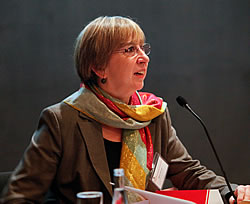Let’s talk about training: How do we move on?
In today’s globalised, multicultural and multilingual world, community interpreting (CI) or Public Service Interpreting (PSI) is essential for establishing and maintaining communication between the members of diverse population groups and local as well as national governments and services. CI is a form of interpreting that is performed in a wide range of settings. It aims to ensure that any person who seeks access to a community or public service is able to do so on the same footing as a native speaker of that community. At the same time, CI enables civil servants and other service providers to provide equal services to all sectors of the population, allowing them to fulfil their legal obligations. It is clear that for CI to achieve its goals, it must be performed by professional interpreters. The key to professionalisation is training.
CI training is offered by many different institutions and agencies today; however, the level of training offered varies greatly. This is partly due to the different and sometimes difficult circumstances in which training may have to be given, due to the varied profiles of aspiring community interpreters, the need to train quickly, lack of funding, and also the lack of insight into the competences and skills required. And yet, regardless of all this and more, quality training is indispensable. The challenge we face is to provide quality training in spite of this diversity and to establish international standards.
The Training and Accreditation Committee of the European Network for Public Service Interpreting and Translation (ENPSIT) is working towards this, focusing on what it considers the essential components to achieve quality in training: the development of a competency profile, and a standard based on the competency profile; the development of a basic but adaptable training programme; reliable assessment and testing methods as a basis for accreditation; continued training and professional development; and, eventually, the establishment of a European register.
But first things first. At InDialog 2015, the ENPSIT panel on “Let’s talk about training: How do we move on?” aims to focus on just a few of the many issues that need to be tackled. Based on the expertise of its panellists, these are:
- The potential of virtual technologies: Ulrike Führer, Head of Interpreting at Context Translation, Ireland, will discuss questions such as: What are the concerns of national authorities and institutions, language service providers, practising and future interpreters and trainers with respect to the restrictions and impact of videoconference mediated interpreting and training?
- Quality control and testing: Heidi Salaets, Head of the Interpreting Studies Research Group at the Faculty of Arts of the University of Leuven, will look into how to create valid testing material and a reliable grading system, and whether technology can be used to aid this process.
- Qualification and accreditation: Carmen Valero Garcés, Professor of Translation and Interpreting at the University of Alcalá, Madrid (Spain), will analyse the impact recent directives and proposals by EU law and policymakers, as well as US academics, have on CI qualification and accreditation.
- Training users: Pat Isaacs, General Manager at University College Hospitals NHS Foundation Trust (UCLH), will highlight ways to ensure the healthcare profession understands how to work with interpreters to provide the very best care for the patient.
In addition, the panel aims to be truly interactive, inviting the audience to respond to the panellists’ presentations, and to provide insight into other topics related to the standardisation of quality training and how this can be achieved in the present for the future. The audience of InDialog is an audience of specialists who will no doubt have valuable contributions to make. They are also warmly invited to join the T&A committee and one of the working groups.
By Prof. Dr. Aline Remael, Department Chair, Professor of Translation and Interpreting at the University of Antwerp
Prof. Dr. Aline Remael will be chairing the ENPSIT panel discussion, which will take place at the InDialog conference on November 21.



